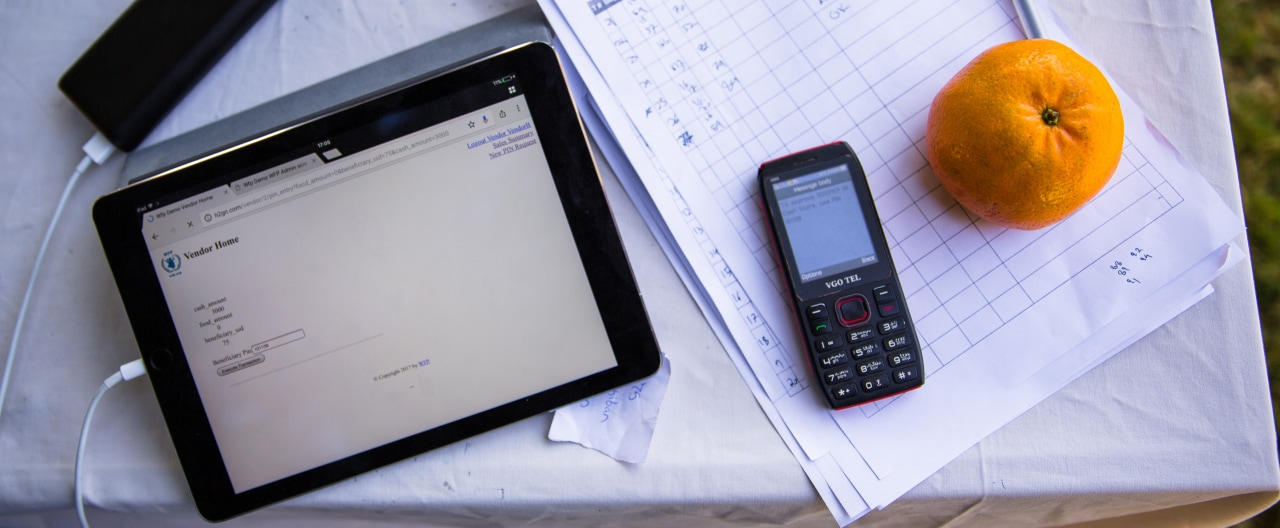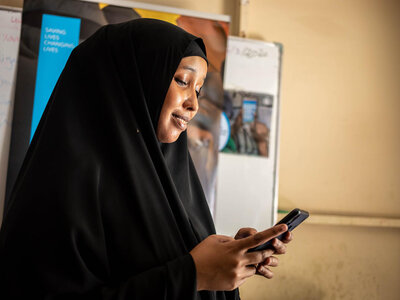Innovation and technology
- 61 million
- people supported by WFP innovations in 2024
- 220 million-plus
- meals shared via ShareTheMeal app
- US$323 million
- deployed via grant funding since the WFP Innovation Accelerator launched in 2015
Innovation and technology allow the World Food Programme (WFP) to speed up its emergency response, scale up assistance and bring greater choice to vulnerable communities. They save us both money and time, meaning WFP can reach more people, more quickly and effectively.
Among the technology we deploy is Hunger Map Live, a real-time, AI-powered platform that monitors food security around the world. Other solutions, including digital finance tools like blockchain technology, allow people to access cash assistance more securely. Simultaneously, WFP continues to provide digital expertise to governments, enhancing their national responses, such as in Iraq, where WFP helped digitize the largest social protection system, benefiting more than 40 million Iraqis.
Innovation means farmers can build resilience through solar-powered food dehydration systems and limit the effects of climate change through portable machines that turn agricultural waste into sellable bioproducts.
There are many more ways that technology helps in WFP’s fight against hunger. This includes improving disaster response by using chatbots for two-way communication with crisis-affected people and equipping communities with connectivity in emergencies.
Collaboration increases global impact
The Munich-based WFP Innovation Accelerator was established in 2015 to source new ideas, sprint pilot projects, and scale high-impact innovations by connecting them with WFP’s global network and field operations in over 120 countries and territories.
In 2024, it ran 18 programmes addressing a wide range of social impact and sustainability issues, including climate change, primary healthcare, gender equality and emergency response.
WFP, UNICEF and UNDP co-lead the UN Innovation Network, where the WFP Innovation Accelerator shares its insights and knowledge with UN counterparts, as well as with NGOs and private-sector innovation groups, through its SDGx Acceleration Programme.
WFP also hosts the UN Advisory Alliance, a team of consultants who deliver management consulting and advisory services across WFP and the wider UN system. The UN Advisory Alliance has supported over 120 business innovation and transformation projects across more than 15 UN entities.
Additionally, WFP leads the Emergency Telecommunications Cluster, a global network of organizations providing communication services for humanitarians during emergencies.
Strengthening strategic partnerships
WFP fosters strategic partnerships with companies and organizations, who in turn supply pro bono access to software, products and professional skills.
Since 2023, Google.org has supported the Humanitarian Ventures Accelerator, a joint programme co-created with support from Google’s Accelerator Team and the WFP Innovation Accelerator, to advance and scale ten ventures created and developed within WFP.
These global innovations, which harness Artificial Intelligence, machine learning, cloud computing and data analytics technologies, focus on improving humanitarian response. One example is SCOUT, a statistical insights tool that aids WFP’s global supply chain network in improving decision-making.
Awards and recognition
WFP is a four-time winner of the Anthem Awards, which recognize social impact work worldwide. The WFP Innovation Accelerator was named in Fast Company’s lists of Best Workplaces for Innovators and Most Innovative Companies (Not-For-Profit) 2021.
Related topics








